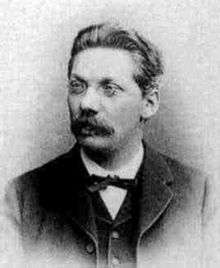Hermann Schubert
| Hermann Schubert | |
|---|---|
 Hermann Cäsar Hannibal Schubert | |
| Born |
22 May 1848 Potsdam, Brandenburg, Prussia |
| Died |
20 July 1911 (aged 63) Hamburg, Germany |
| Residence | Germany |
| Nationality | German |
| Fields | Mathematician |
| Institutions | Realgymnasium Andreanum |
| Alma mater | Universität Berlin |
| Known for |
Enumerative geometry Schubert calculus |
Hermann Cäsar Hannibal Schubert (22 May 1848 – 20 July 1911)[1] was a German mathematician.
Schubert was one of the leading developers of enumerative geometry, which considers those parts of algebraic geometry that involve a finite number of solutions. In 1874, Schubert won a prize for solving a question posed by Zeuthen. Schubert calculus was named after him.
Schubert tutored Adolf Hurwitz at the Realgymnasium Andreanum in Hildesheim, Hanover, and arranged for Hurwitz to study under Felix Klein at University.
See also
- Schubert cycle or Schubert variety
- Schubert polynomial
Publications
- Schubert, Hermann (1979) [1879], Kleiman, Steven L., ed., Kalkül der abzählenden Geometrie, Reprint of the 1879 original (in German), Berlin-New York: Springer-Verlag, ISBN 3-540-09233-1, MR 0555576
References
- Werner Burau and Bodo Renschuch, "Ergänzungen zur Biographie von Hermann Schubert," (Complements to the biography of Hermann Schubert,) Mitt. Math. Ges. Hamb. 13, pp. 63–65 (1993), ISSN 0340-4358.
External links
- O'Connor, John J.; Robertson, Edmund F., "Hermann Schubert", MacTutor History of Mathematics archive, University of St Andrews.
- Works by Hermann Schubert at Project Gutenberg
- Works by or about Hermann Schubert at Internet Archive
- Hermann Schubert at the Mathematics Genealogy Project
This article is issued from Wikipedia - version of the 4/19/2016. The text is available under the Creative Commons Attribution/Share Alike but additional terms may apply for the media files.